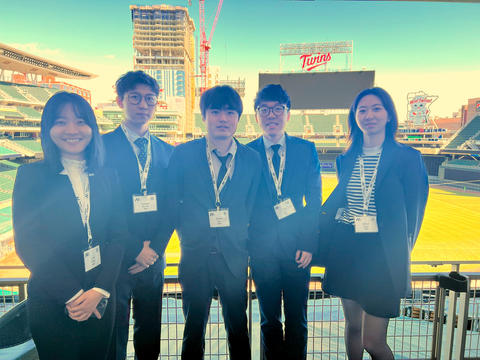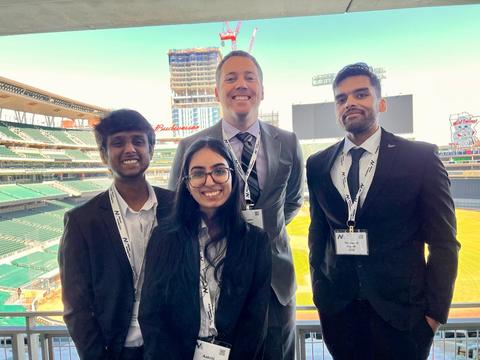
MSBA Teams Take Home Top Prizes at MLB Case Competition
Thursday, April 20, 2023
With the Major League Baseball (MLB) season still in its first month, fans are flocking to ballparks across the country to see some of the game’s biggest stars.
But the attendance of an MLB game can depend on all sorts of factors, including the day of the week of the game, who the opponent is, and team success, among others.
Two teams of Carlson School Master of Science in Business Analytics (MSBA) students explored these variables and more at the MinneMUDAC Student Data Science Challenge case competition held at Target Field, home of the Minnesota Twins.
Between the two teams, they took home the overall winner and the bonus award at the competition, beating out 10 other graduate-level analytics teams from across the country.
The teams used data to determine what factors influence home-game attendance for the Twins, building predictive models for the game-by-game attendance. With more accurate attendance predictions, managers at the stadium can make planning decisions more confidently. For example, knowing the expected attendance will help managers decide how many staff are needed on duty and even how many hot dogs to order for the concession stands.
The overall winning team consisted of MSBA students Lan Chen, Simin Liao, Jichen Liu, Rio Pan, and Congyi Zhang and was supervised by Assistant Professor Yicheng Song.
For the bonus, teams developed a model-driven approach for creating an optimal 2023 game schedule for the Twins that maximizes game-by-game attendance for the team’s 81 home games. The bonus competition was won by MSBA students Aakriti Aneja, Ram Gajalakshmi Senthil Nathan, Justin Mason, and Divyansh Tripathi and was supervised by Assistant Professor Mochen Yang.
“It was a tremendous honor to be chosen as the winning team of the competition,” Liao says. “The whole competition was super fun. This was a very valuable experience and it’s something I can look back on when I’m looking for jobs after graduation.”
The two teams presented their findings in front of 10 groups of judges made up of professors and industry professionals. The judges praised the students for their application of sophisticated predicting modeling techniques, including transformer and LightGBM models, and their outstanding presentation skills.
Case competitions, such as this one, provide MSBA students with the opportunity to apply what they learn in the classroom to real-life data sets.
“You learn something new from every project you work on,” Liu says. “Competitions like this are a great way to put our skills to the test.”
One of the key differentiators between the Carlson School and others in the competition was the presentation to the judges. At the Carlson School, students are taught how to harvest, process, and analyze data to answer important questions and explain their findings in an easy-to-understand way.
“You really could see the Carlson School advantage,” says Mason. “One of the key components of this competition was being able to build a compelling presentation. Obviously, the baseline skills are important, but implementing them into a coherent presentation is another huge factor.”

